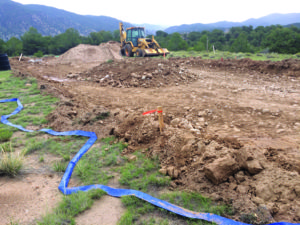By Martha Quillen
Today in the U.S.A., ordinary citizens regard their political opponents as dangerous. Political anxiety is creating an almost universal sense of injustice. In the July 11 Mountain Mail, frequent contributor Linda Taylor addressed that phenomenon in a letter to Judith Ann Smith, who had previously expressed concern about the influence of Democrats.
Taylor wrote, “In her most recent letter, she asks, ‘Is America headed for Democrat-only restaurants?’”
“Ms. Smith, you have a Republican president, a Republican House, a Republic (sic) Senate. Every cabinet member is a Republican. All federal agencies are headed up by Republicans. The Supreme Court, though supposedly apolitical, is moving rapidly toward a majority that supports Republican policies.
“The Koch Brothers, the NRA and other Republican corporations are pouring millions of dollars into GOP coffers … What more do you want?”
As a registered Democrat, I thought Taylor’s response was bright and funny. But to be fair, I suspect the original writer wants what most of us do: To live in a place where she doesn’t feel threatened by other people’s political views.
The germane question here is the one Taylor implies: Why does Ms. Smith feel so threatened? And yet it’s clear that Taylor also feels threatened, even though they are writing to a newspaper in Salida, Colorado, which is hardly in the eye of a national political storm.
[InContentAdTwo]
Political divisions inspired a different view from Brady Becker, who wrote the Mail and said, “A majority of the issues voiced here in the Letters to the Editor seem to be rants about partisan issues entirely out of our control.” Then Becker recommends focusing on matters closer to home. “Let’s focus on being apolitical agents of change, build our communities together and enable our mayors and commissioners to produce smart, impactful results.”
His idea astounded me because it’s the opposite of my own reaction to our divisive era. Don’t get me wrong; I understand Becker’s point, and am impressed by the people who are doing just that (and there are many). Salidans are clamoring for affordable housing and discussing economic development. They’re manning soup kitchens, collecting for food banks, and running for office.
Yet I sometimes find local political trends even more disturbing than national ones.
Rural Colorado politics have changed considerably since I first encountered them. Four decades ago, my husband and I owned a newspaper in Kremmling, a Colorado mountain town that wasn’t Mayberry-esque, and didn’t want to be. Politics were pretty unrestrained there. Insults were frequently exchanged and arguments got caustic. But afterwards, people sat under the two-headed calf mounted on the wall at a local saloon and drank together.
A logging, ranching and mill town, Kremmling had a significant population of young male workers who drank too much and carried weapons. I witnessed two shooting sprees in the four years we worked there, and I remember our newspaper covering another three. There may have been more. Yet nobody seemed to feel particularly threatened by such histrionics. All five of the shootings, I remember, involved lone shooters responding to an insult, and the only casualties were mirrors, lights and windows. No one was shot, and curiously enough, lots of locals felt sorry for the young instigators who lost their tempers and landed in jail.
Now I often find myself feeling sorry for earnest citizens, local activists and office holders, because public spokesmen too often get vilified and scorned as if they were criminals. Today, political sides gang up on one another; they gossip, they ridicule, they plot their strategies, target their opponents, and purposely build enmity. I think the fundamental difference between politics now and then is that legal and technical developments have encouraged pack behavior. And in pack politics, the thoughts and emotions of the opposition are no more relevant than the feelings of prey – and that’s true in Congress and local government chambers.
In our era, the leading bi-partisan effort is the production of alarming information about our increasingly partisan world. That theme is central to Amy Chua’s “Political Tribes,” Madeleine Albright’s “Fascism: A Warning,” Arlie Hochschild’s “Strangers in Our Own Land: Anger and Mourning On the American Right,” and works by psychologist Jonathan Haidt and journalist Thomas Frank, as well as economists and former congressmen. It permeates commentary on Fox and MSNBC, inspires stand-up comedians, and is essential to an entire sub-genre of tomes about the death of liberalism, truth, democracy and freedom.
And whether the approach of authors is liberal, conservative or something else, this output reveals an obvious truism: people are very upset about modern politics. But who’s listening? In politics, citizens routinely dismiss the other side’s feelings, fears, and predicaments in order to present a better case for themselves. So how is government supposed to work?
One might presume that finding homosexuality, soda pop, dogs or pierced ears personally distasteful is probably not a good enough reason to ban any of those things for other people. But that’s only if we assume other people’s feelings matter. If instead we assume that the strongest pack should prevail?
Clearly, logic has a role in politics, but emotions count, and that’s not just natural, it’s imperative. Emotion is the body’s warning system that something is wrong. And yes, sometimes our emotions lead us astray. But when tens of thousands of people world-wide are clamoring with resentment? It’s probably safe to assume that we are struggling due to major transitions that need to be addressed.
Lately it has occurred to me that local and national politics are pretty much the same; they are both about division and direction and what we need to do. It takes city, county, state and federal governments working with private businesses and citizens to provide our roads, clean water, courts, defense systems and educational institutions, and to supply oversight and infrastructure for utilities, trade and communications.
Although the times are indeed “a-changing,” most political concerns are classic. In a 50th anniversary commemoration, PBS featured 1968: America in Turmoil: Conservative Politics, and the election of Richard Nixon, and it’s strange how much Nixon sounded like Hillary Clinton. In his acceptance speech, Nixon talked about a teenager holding up a sign saying “Bring Us Together,” and concluded, “That will be the objective of this administration.”
However, Nixon’s anxieties and insecurities crashed his presidency. He could have been great. He championed clean air and water, and established the environmental movement. He got us out of Vietnam, and opened trade with China. But Nixon lost his way.
And so have we all, because we seem to think other citizens can be pushed, prodded and tugged right and left without regard to what they think or feel. Now dissonance is raging into a perceptible force, despite being tamped down, outlawed and ignored, which is a sure sign that too many people feel neglected and put-upon.
Ignoring or chastening those clamoring for recognition merely makes our problems fester.
We need to hear the cries of those who feel marginalized and abused, not to find out what they think is wrong with their opponents, but to find out what they feel is wrong in their own lives. The truth behind all of the distortions, manipulations and fake news is that we are all in this together. If we would rather fight than hear, negotiate or work with one another? We go down together.
A product of 20th century journalism classes, Martha Quillen tries to see issues from both sides, which in the 21st century means almost nobody agrees with her on anything.


